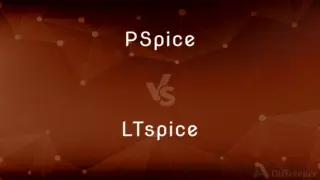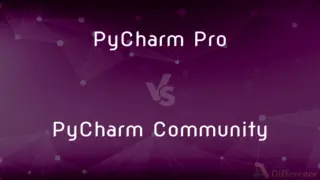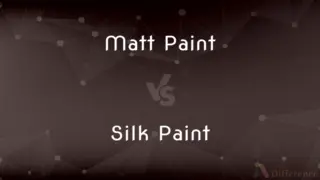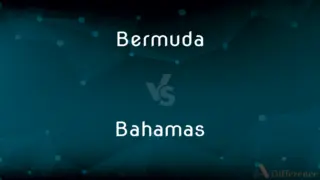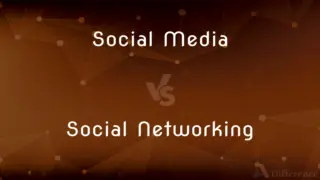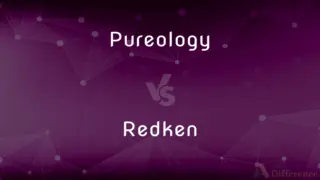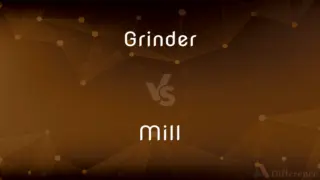Fine vs. Cute — What's the Difference?
By Fiza Rafique & Urooj Arif — Updated on March 14, 2024
"Fine" often describes something of high quality or impressive appearance, suggesting sophistication or excellence, while "cute" refers to something charming, endearing, or attractive in a youthful or innocent way.

Difference Between Fine and Cute
Table of Contents
ADVERTISEMENT
Key Differences
The term "fine" is used to express admiration for something that stands out due to its quality, beauty, or impressiveness. It carries a tone of elegance and can apply to a wide range of contexts, from physical appearance to the arts. For example, describing a dining experience as fine suggests not only delicious food but also an exceptional atmosphere and service. In contrast, "cute" often focuses on qualities such as smallness, innocence, and charm that evoke a sense of warmth and affection. It is frequently used to describe animals, babies, or objects that arouse a protective or nurturing response.
Fine attributes are typically appreciated for their refinement and ability to impress or signify status. For instance, fine jewelry implies not just beauty but also high value and craftsmanship. On the other hand, cute is associated with a more casual, universally appealing charm that can bring joy and comfort to a broader audience, like a cute kitten video that becomes widely beloved for its playful innocence.
While "fine" can denote approval or a high standard of excellence in people, places, and things, suggesting a polished or sophisticated allure, "cute" focuses more on an instinctive appeal that often does not rely on sophistication or elegance but rather on an inherent appeal to softer, more emotional reactions.
The appreciation of fine qualities often requires a developed taste or understanding to fully appreciate the depth and nuance, such as fine art or fine wine, where the appreciation might grow with knowledge and experience. Conversely, the appeal of something cute is usually immediate and requires little to no specialized knowledge to enjoy, appealing directly to basic human instincts of care and affection.
While both "fine" and "cute" are positive descriptors, they cater to different senses of appreciation. Fine speaks to a discerning taste for excellence and sophistication, whereas cute appeals to a universal sense of charm and innocence.
ADVERTISEMENT
Comparison Chart
Definition
High quality, impressive, sophisticated
Charming, endearing, attractive in a youthful or innocent way
Connotation
Elegance, excellence, refinement
Warmth, innocence, universal appeal
Typical Use
Art, dining, fashion
Animals, babies, playful designs
Appeal
Sophisticated taste, status
Broad audience, emotional reaction
Requirement
Developed taste or understanding
Immediate, instinctive appreciation
Compare with Definitions
Fine
High quality or a certain standard of excellence.
She wore a fine silk dress that drew everyone's attention.
Cute
Attractive in an endearing way, particularly relating to youth or smallness.
The puppy's cute antics made everyone smile.
Fine
Referring to something very thin or lightweight.
The manuscript was written in fine ink.
Cute
Charming or appealing in a delicate way.
The child's cute expression won many hearts.
Fine
Used to describe a state of well-being.
How are you? I'm fine, thank you.
Cute
Designed or appealing in a way that evokes affection.
She received a cute plush toy as a gift.
Fine
Denoting something impressive or beautiful in appearance.
The gallery displayed fine pieces from contemporary artists.
Cute
Denoting something clever or ingeniously simple.
He came up with a cute solution to the problem.
Fine
In a manner of high skill or capability.
The chef prepared the meal with fine expertise.
Cute
Used to describe a person's attractive features that evoke a desire to protect or care for them.
Her cute smile brightened the room.
Fine
Of superior quality.
The tree frog that they encountered was truly a fine specimen.
Only a really fine wine could fully complement Lucía's hand-made pasta.
Cute
Attractive in a pretty or endearing way
She had a cute little nose
Fine
Of superior quality, skill, or appearance
A fine day.
A fine wine.
Cute
Clever or cunning, especially in a self-seeking or superficial way
The two brothers were cute enough to find a couple of rich women and marry them
She had a real cute idea
Fine
Excellent in character or ability
A fine person.
A fine writer.
Cute
Attractive or pretty in a youthful or dainty way
A cute puppy.
A child wearing a cute outfit.
Fine
Very small in size, weight, or thickness
Fine type.
Fine paper.
Cute
Clever or witty, especially in an impertinent or evasive way, as in falsely suggesting that one is ignorant about the matter at hand.
Fine
Free from impurities.
Cute
Possessing physical features, behaviors, personality traits or other properties that are mainly attributed to infants and small or cuddly animals; e.g. fair, dainty, round, and soft physical features, disproportionately large eyes and head, playfulness, fragility, helplessness, curiosity or shyness, innocence, affectionate behavior.
Our reaction to cute attributes is understood as the way nature ensures mammals care for their young.
Fine
(Metallurgy) Containing pure metal in a specified proportion or amount
Gold 21 carats fine.
Cute
Lovable, charming, attractive or pleasing, especially in a youthful, dainty, quaint or fun-spirited way.
Let's go to the mall and look for cute girls.
Fine
Very sharp; keen
A blade with a fine edge.
Cute
Mentally keen or discerning (See also acute)
Cute trick, but can you do it consistently?
Fine
Thin; slender
Fine hairs.
Cute
Evincing cleverness; surprising in its elegance or unconventionality (but of limited importance).
There's a cute alternative proof of this using lambda calculus.
Fine
Carefully or delicately made or done
Fine china.
Cute
Clever; sharp; shrewd; ingenious; cunning.
Fine
Consisting of very small particles; not coarse
Fine dust.
Cute
Smart-alecky or impertinent; as, a cute remark.
Fine
Marginally different or subtle
A fine difference.
Cute
Affectedly clever.
Fine
Able to make or detect effects of great subtlety or precision; sensitive
Has a fine eye for color.
Cute
Attractive especially by means of smallness or prettiness or quaintness;
A cute kid with pigtails
A cute little apartment
Cunning kittens
A cunning baby
Fine
Trained to the highest degree of physical efficiency
A fine racehorse.
Cute
Obviously contrived to charm;
An insufferably precious performance
A child with intolerably cute mannerisms
Fine
Characterized by refinement or elegance
People in the finest society.
Fine
Satisfactory; acceptable
Handing in your paper on Monday is fine.
Fine
Being in a state of satisfactory health; quite well
"How are you?" "I'm fine.".
Fine
Used as an intensive
A fine mess.
Fine
Finely.
Fine
(Informal) Very well
Doing fine.
Fine
To make or become finer, purer, or cleaner.
Fine
To require the payment of a fine from; impose a fine on.
Fine
A sum of money required to be paid especially to the government as a penalty for an offense.
Fine
(Obsolete) An end; a termination.
Fine
Senses referring to subjective quality.
Fine
(ironic) Impressively bad, inappropriate, or unsatisfactory.
You're a fine one to talk about laziness.
Here's another fine mess you've gotten us into.
Fine
(informal) Being acceptable, adequate, passable, or satisfactory.
How are you today? – Fine.
Will this one do? It's got a dent in it. – Yeah, it'll be fine, I guess.
It's fine with me if you stay out late, so long as you're back by three.
Fine
(informal) Good-looking, attractive.
That man is so fine that I'd jump into his pants without a moment's hesitation.
Fine
Subtle, delicately balanced or discriminated.
Fine
(obsolete) Showy; overdecorated.
Fine
Delicate; subtle; exquisite; artful; dexterous.
Fine
An answer often used to cover an unnecessary explanation, rather to avoid conflict or an argument. Saying "I'm fine" can be used to avoid inquiry when the speaker is not really okay.
Do you want to talk about what happened? – [sharply, with annoyance or discomfort] I'm fine!
Fine
Senses referring to objective quality.
Fine
Of a particular grade of quality, usually between very good and very fine, and below mint.
The small scratch meant that his copy of “X-Men #2” was merely fine when it otherwise would have been “near mint”.
Fine
(of weather) Sunny and not raining.
Fine
Consisting of especially minute particulates; made up of particularly small pieces.
Grind it into a fine powder.
When she touched the artifact, it collapsed into a heap of fine dust.
Fine
Particularly slender; especially thin, narrow, or of small girth.
The threads were so fine that you had to look through a magnifying glass to see them.
Fine
Made of slender or thin filaments.
They protected themselves from the small parasites with a fine wire mesh.
Fine
Having a (specified) proportion of pure metal in its composition.
Coins nine tenths fine.
Fine
(cricket) Behind the batsman and at a small angle to the line between the wickets.
...to nudge it through the covers (or tickle it down to fine leg) for a fournb...
Fine
(obsolete) Subtle; thin; tenuous.
Fine
Expression of (typically) reluctant or agreement.
Fine
Well, nicely, in a positive, agreeable way.
Fine
Finely; elegantly; delicately.
Fine
In a manner so that the driven ball strikes the object ball so far to one side as to be barely deflected, the object ball being driven to one side.
Fine
Fine champagne; French brandy.
Fine
Something that is fine; fine particles.
They filtered silt and fines out of the soil.
Fine
A fee levied as punishment for breaking the law.
The fine for jay-walking has gone from two dollars to thirty in the last fifteen years.
Fine
(obsolete) Money paid by a tenant on the commencement of a tenancy so that his or her rent may be small or nominal.
Fine
(Cantab slang) A drink that must be taken during a meal or as part of a drinking game, following an announcement that anyone who has done some (usually outrageous) deed is to be fined; similar to I have never; commonly associated with swaps; very similar to a sconce at Oxford University, though a fine is the penalty itself rather than the act of issuing it.
Fine if you've…
Fine
(music) The end of a musical composition.
Fine
(music) The location in a musical score that indicates the end of the piece, particularly when the piece ends somewhere in the middle of the score due to a section of the music being repeated.
Fine
(obsolete) End; conclusion; termination; extinction.
Fine
(feudal law) A final agreement concerning lands or rents between persons, as the lord and his vassal.
Fine
A sum of money or price paid for obtaining a benefit, favor, or privilege, as for admission to a copyhold, or for obtaining or renewing a lease.
Fine
(transitive) To make finer, purer, or cleaner; to purify or clarify.
To fine gold
Fine
(intransitive) To become finer, purer, or cleaner.
Fine
To make finer, or less coarse, as in bulk, texture, etc.
Fine
To change by fine gradations.
To fine down a ship's lines, i.e. to diminish her lines gradually
Fine
(transitive) To clarify (wine and beer) by filtration.
Fine
To become gradually fine; to diminish; to dwindle (with away, down, or off).
Fine
(transitive) To issue a fine as punishment to (someone).
She was fined a thousand dollars for littering, but she appealed.
Fine
(intransitive) To pay a fine.
Fine
To finish; to cease.
Fine
To cause to cease; to stop.
Fine
Finished; brought to perfection; refined; hence, free from impurity; excellent; superior; elegant; worthy of admiration; accomplished; beautiful.
The gain thereof [is better] than fine gold.
A cup of wine that's brisk and fine.
Not only the finest gentleman of his time, but one of the finest scholars.
To soothe the sick bed of so fine a being [Keats].
Fine
Aiming at show or effect; loaded with ornament; overdressed or overdecorated; showy.
He gratified them with occasional . . . fine writing.
Fine
Nice; delicate; subtle; exquisite; artful; skillful; dexterous.
The spider's touch, how exquisitely fine!
The nicest and most delicate touches of satire consist in fine raillery.
He has as fine a hand at picking a pocket as a woman.
Fine
Not coarse, gross, or heavy
The eye standeth in the finer medium and the object in the grosser.
Fine
Not coarse; comminuted; in small particles; as, fine sand or flour.
Fine
Having (such) a proportion of pure metal in its composition; as, coins nine tenths fine.
Fine
Used ironically.
Ye have made a fine hand, fellows.
Fine
To make fine; to refine; to purify, to clarify; as, to fine gold.
It hath been fined and refined by . . . learned men.
Fine
To make finer, or less coarse, as in bulk, texture, etc.; as. to fine the soil.
Fine
To change by fine gradations; as (Naut.), to fine down a ship's lines, to diminish her lines gradually.
I often sate at homeOn evenings, watching how they fined themselvesWith gradual conscience to a perfect night.
Fine
To impose a pecuniary penalty upon for an offense or breach of law; to set a fine on by judgment of a court; to punish by fine; to mulct; as, the trespassers were fined ten dollars.
Fine
To finish; to cease; or to cause to cease.
Fine
To become fine (in any one of various senses); as, the ale will fine; the weather fined.
I watched her [the ship] . . . gradually fining down in the westward until I lost of her hull.
Fine
End; conclusion; termination; extinction.
Is this the fine of his fines?
Fine
A sum of money paid as the settlement of a claim, or by way of terminating a matter in dispute; especially, a payment of money imposed upon a party as a punishment for an offense; a mulct.
Fine
A final agreement concerning lands or rents between persons, as the lord and his vassal.
Fine
A sum of money or price paid for obtaining a benefit, favor, or privilege, as for admission to a copyhold, or for obtaining or renewing a lease.
Fine
Finely; well; elegantly; fully; delicately; mincingly.
Fine
In a manner so that the driven ball strikes the object ball so far to one side as to be deflected but little, the object ball being driven to one side.
Fine
Money extracted as a penalty
Fine
Issue a ticket or a fine to as a penalty;
I was fined for parking on the wrong side of the street
Move your car or else you will be ticketed!
Fine
Superior to the average;
In fine spirits
A fine student
Made good grades
Morale was good
Had good weather for the parade
Fine
Being satisfactory or in satisfactory condition;
An all-right movie
The passengers were shaken up but are all right
Is everything all right?
Everything's fine
Things are okay
Dinner and the movies had been fine
Another minute I'd have been fine
Fine
Minutely precise especially in differences in meaning;
A fine distinction
Fine
Of texture; being small-grained or smooth to the touch or having fine particles;
Wood with a fine grain
Fine powdery snow
Fine rain
Batiste is a cotton fabric with a fine weave
Covered with a fine film of dust
Fine
Being in good health;
He's feeling all right again
I'm fine, how are you?
Fine
Thin in thickness or diameter;
A fine film of oil
Fine hairs
Read the fine print
Fine
Characterized by elegance or refinement or accomplishment;
Fine wine
Looking fine in her Easter suit
A fine gentleman
Fine china and crystal
A fine violinist
The fine hand of a master
Fine
; free or impurities; having a high or specified degree of purity;
Gold 21 carats fine
Fine
(of weather) pleasant; not raining, perhaps with the sun shining;
A fine summer evening
Fine
Sentence-initial expression of agreement
Fine
In a delicate manner;
Finely shaped features
Her fine drawn body
Fine
In a superior and skilled manner;
The soldiers were fighting finely
Common Curiosities
Is "fine" always a compliment?
While often a compliment, "fine" can be context-dependent; in some cases, it might imply something is acceptable but not extraordinary.
Can something be both fine and cute?
Yes, an item or person can possess qualities that are both fine (high-quality, impressive) and cute (charming, endearing), depending on the context and perspective.
Is the appeal of "cute" universal?
While the appeal of "cute" things is widespread, individual tastes can vary, influenced by cultural, personal, and contextual factors.
Does "fine" imply luxury?
"Fine" often implies a degree of luxury or sophistication, especially when referring to goods, art, or dining experiences.
Can the perception of what is "cute" evolve over time?
Yes, cultural shifts, trends, and personal experiences can influence and change what individuals find cute.
How do trends impact what is considered "fine" or "cute"?
Trends play a crucial role in shaping perceptions of what is considered "fine" or "cute." For example, fashion and design trends can elevate certain styles to be seen as the epitome of "fine" elegance or "cute" appeal, influencing consumer desires and industry standards.
Do cultural differences influence the perception of "fine" and "cute"?
Yes, cultural backgrounds can significantly influence what is considered "fine" or "cute." For instance, perceptions of luxury and quality (fine) and what is considered charming or endearing (cute) can vary widely between cultures, affecting preferences and values.
Is it possible for "fine" or "cute" to have negative connotations?
In certain contexts, "fine" can imply something is merely adequate, lacking enthusiasm or depth in approval. Similarly, "cute" might be viewed negatively if perceived as diminishing seriousness or professionalism, suggesting something is appealing only in a superficial or diminutive way.
How does the context change the meaning of "fine"?
In approval contexts, "fine" signifies high quality or excellence. However, in wellbeing inquiries, it often simply means "okay" or "satisfactory."
How do "fine" and "cute" affect consumer behavior?
"Fine" products often appeal to consumers seeking luxury, quality, and status, leading to a willingness to invest more in high-end goods. "Cute" items attract a broad range of consumers, including those looking for gifts, decorative items, or products that evoke a sense of joy and comfort, often resulting in impulse purchases.
Are there industries built around "cute" or "fine" concepts?
Yes, industries such as fashion, luxury goods, and collectibles often pivot around the concepts of "fine" (luxury, sophistication) and "cute" (appealing, marketable designs).
Can the terms "fine" and "cute" be used in professional settings?
While "fine" is commonly used in professional settings to describe quality or status (e.g., fine craftsmanship), "cute" may be less appropriate in certain contexts due to its association with youthfulness and informality. However, "cute" can be suitable in industries like design, where emotional appeal is important.
Share Your Discovery

Previous Comparison
Perceive vs. Recognize
Next Comparison
Apocalypse vs. RevelationAuthor Spotlight
Written by
Fiza RafiqueFiza Rafique is a skilled content writer at AskDifference.com, where she meticulously refines and enhances written pieces. Drawing from her vast editorial expertise, Fiza ensures clarity, accuracy, and precision in every article. Passionate about language, she continually seeks to elevate the quality of content for readers worldwide.
Co-written by
Urooj ArifUrooj is a skilled content writer at Ask Difference, known for her exceptional ability to simplify complex topics into engaging and informative content. With a passion for research and a flair for clear, concise writing, she consistently delivers articles that resonate with our diverse audience.


















